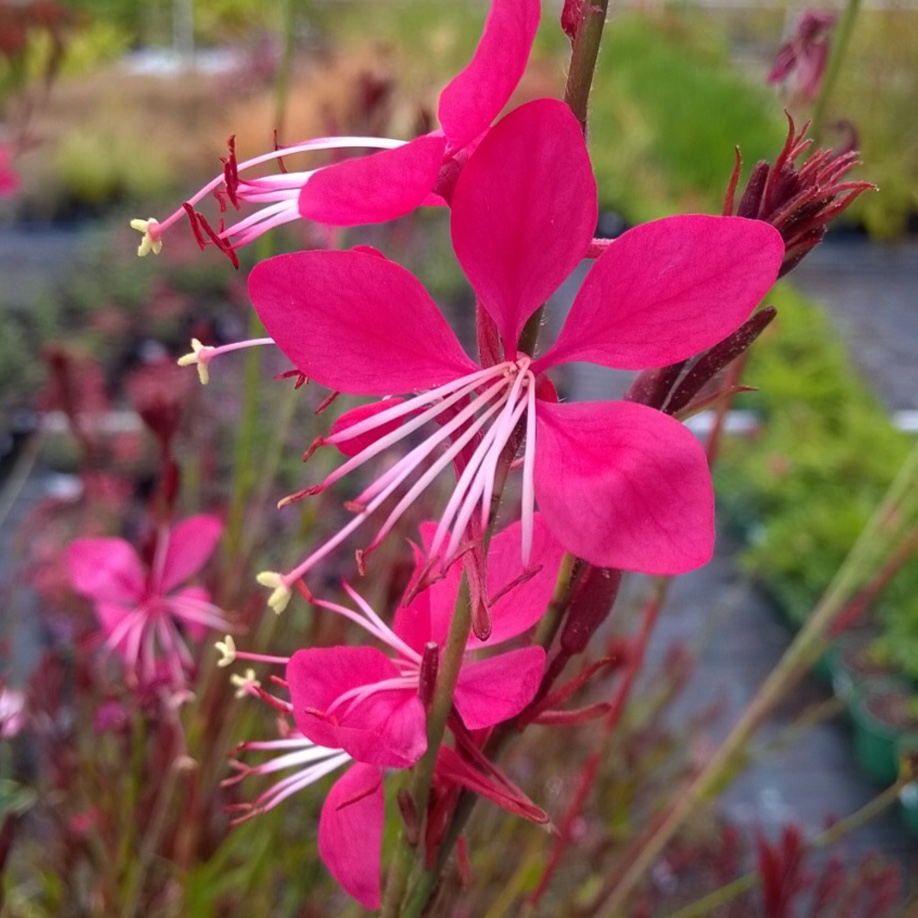
Oenothera lindheimeri 'Whiskers Deep Rose' syn. Gaura lindheimeri 'Whiskers Deep Rose'
Lindheimer's Beeblossom 'Whiskers Deep Rose'
Gaura is a genus of flowering plants commonly known as beeblossoms. They are annual, biennial or perennial herbaceous plants. Several species are regarded as noxious weeds, especially in overgrazed areas where it easily takes hold. The species G. lindheimeri are cultivated as garden plants. The deep reddish pink flowers of this gaura are accentuated by a cluster of spidery white stamens.
Contributed by @robbiec
-
Full sun
-
Very little water
-
Frost Hardy: 23F (-5°C)
-
Rich and free draining
Common name
Lindheimer's Beeblossom 'Whiskers Deep Rose'
Latin name
Oenothera lindheimeri 'Whiskers Deep Rose' syn. Gaura lindheimeri 'Whiskers Deep Rose'
type
Herbaceous Perennial
family
Onagraceae
ph
6.0 - 7.5 Acid - Neutral
Plant & bloom calendar
-
Best time to plant
full grown dimensions
 0.40 M
0.40 M
0.40 M
0.40 M
Oenothera lindheimeri 'Whiskers Deep Rose' syn. Gaura lindheimeri 'Whiskers Deep Rose'
Gaura is a genus of flowering plants commonly known as beeblossoms. They are annual, biennial or perennial herbaceous plants. Several species are regarded as noxious weeds, especially in overgrazed areas where it easily takes hold. The species G. lindheimeri are cultivated as garden plants. The deep reddish pink flowers of this gaura are accentuated by a cluster of spidery white stamens.
Planting
From Early Spring TO Early Spring
A tap rooted perennial, growing gaura plants do not like to be moved from place to place, so plant them where you want them to remain for several years. Plant them into a full sun area with rich soil and deep drainage. Growth needs of the gaura plant include organic soil. This encourages development of the taproot. The plants are drought tolerant once established, consequently, little care of gaura is needed. Water the plant in its pot thoroughly before planting – give it a good soaking. Prepare the area by digging a hole twice the size of the pot. Dig compost into the base of the hole. Remove the pot and position the plant in the hole, with the top of the rootball about level with the surrounding soil. Refill the planting hole with a mixture of garden soil and compost, firming as you go. Water in well and keep well watered during the plant's first year.
Propagation
From Early Spring TO Early Summer
Propagate by seed in pots in a cold frame from spring to early summer or propagate by basal cuttings or softwood cuttings in spring or semi-hardwood cuttings in summer
Planting in containers
From Early Spring TO Early Spring
Use good quality compost for container growing and raise the pot on 'pot feet' through the winter months to help with drainage.









